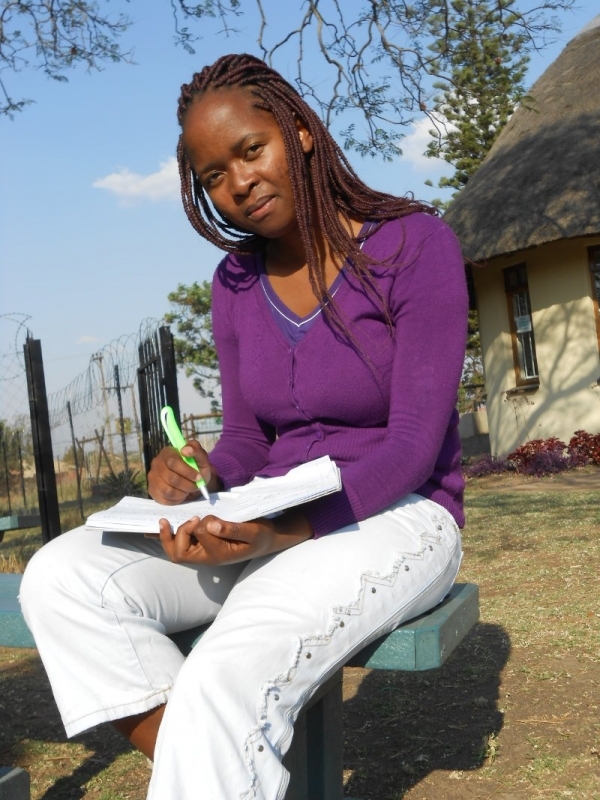How bureaucracy is delaying Virginia’s dream of being a doctor

Virginia Sibanda, like thousands of youth across South Africa in November 2014, was hunched over a desk, pen in hand, taking her matric exams. Her years of accumulated academic trophies and certificates culminated in these papers. She had attended tutoring sessions, practiced the past exams, and had applied to universities to pursue her dream of studying medicine.
A few weeks later, after an anxious wait, she, along with her peers, poured over the newspaper for their last name and exam number. Virginia had passed with three As, three Bs and one C.
“My sisters were very happy. They would motivate me. They would tell me to work hard. [They told me that] even though things are difficult, something will come up.“
Virginia’s results saw her finish in the top three from over 200 matric learners at Kaalfontein Secondary School, a no-fee public school of prefab buildings in Ivory Park, Gauteng. She smiles shyly, admitting that she “knew that she was going to be in the top three.” From grade eight, Virginia had been a high achiever in her high school. She was especially motivated in matric, pushed by teachers and friends to aim for one of the school’s three provincial government bursaries. The Gauteng City Region Academy (GCRA) bursaries cover tertiary education tuition and living costs for top-achieving students in Gauteng’s poorest, no-fee schools. With her results, Virginia had qualified for the bursary.
With the promise of funding, and having been accepted into Medicine at Medunsa (along with programmes at Wits and University of Johannesburg), Virginia was well on the way to achieving her dream.
A few days after receiving her results, however, matters took an about turn. “I was shocked…because I didn’t have citizenship, or a passport with a permit, I couldn’t get the bursary … they just dropped me like that.”
Virginia was born in Zimbabwe and migrated to South Africa when she was 13 years old and in grade six. There are many factors that contributed to her leaving. One was education, with her family struggling to support her schooling. “My mother died when I was about to start grade one. My sisters and brothers were older than me and they took care of me. Many of them came here to South Africa and decided that we should come and finish our schooling here.”
Virginia has asylum seeker status in South Africa. This allows her to study and work in the country. However, this documentation is not sufficient for the GCRA bursary. Without citizenship and a passport, she was also ineligible for other bursaries to which she’d applied. It was not as simple however, as applying for a passport and permit. When her mother died, Virginia did not have a birth certificate. Her sister later applied for one, but incorrectly entered Virginia’s date of birth. Virginia cannot correct this date without parental consent, or, in the case of their being deceased, a death certificate. However a certificate was not issued upon her mother’s death. This leaves Virginia in a position where she can only apply for a passport once her incorrectly dated birth certificate deems her no longer a minor. Without the correct “papers” she occupies an uncertain and precarious space in South African society.
“I wanted to be a medical doctor. If not that, a nurse. That’s my passion, my dream, my goal.”
Virginia is emotional when she recounts her experience. “I wanted to do medicine. I wanted to be a medical doctor. If not that, a nurse. That’s my passion, my dream, my goal.” Actively involved in community service, Virginia’s passion for caring for people permeates her life. Without a bursary, there is little chance she can pursue her dream to study healthcare.
“That was the most traumatising thing I had ever experienced in my life. I love education with my whole heart. Getting those results, I know I had worked very hard [for them]. But just being dropped like that made me feel worthless. It depressed me. I just lost hope.”
Today Virginia is a part-time student studying toward Life Science and Biomedical Science at UNISA. As a long-time volunteer in Tzu Chi, a Taiwanese-founded Buddhist charitable organization, Virginia was granted a bursary by the foundation to study at UNISA. “It was quite a relief to receive the Tzu-chi bursary, it came to the rescue”.
She admits that long-distance learning has its challenges, especially without resources like a laptop. She travels to the UNISA campus in Pretoria almost four times a week to access computers and Internet. Without classes and regular academic support, “when I’m stuck,” she says, “Google is my best friend.”
Despite the challenges she’s faced, Virginia believes her life is better in South Africa. She has every intention of staying. To youth in a similar position to her, she says, “[my] message is that they must not lose hope”. Once she graduates from UNISA she intends to work for five years, before funding her own studies in medicine. “My dream, if I become a medical doctor or nurse, is to also open up an orphanage or old age home, as a way of giving back to the community.”
Support independent journalism
Donate using Payfast

Don't miss out on the latest news
We respect your privacy, and promise we won't spam you.
Next: “Application dismissed” - a reflection on My Vote Counts, and losing
Previous: Rugby on the Cape Flats

This article is licensed under a Creative Commons Attribution-NoDerivatives 4.0 International License.
